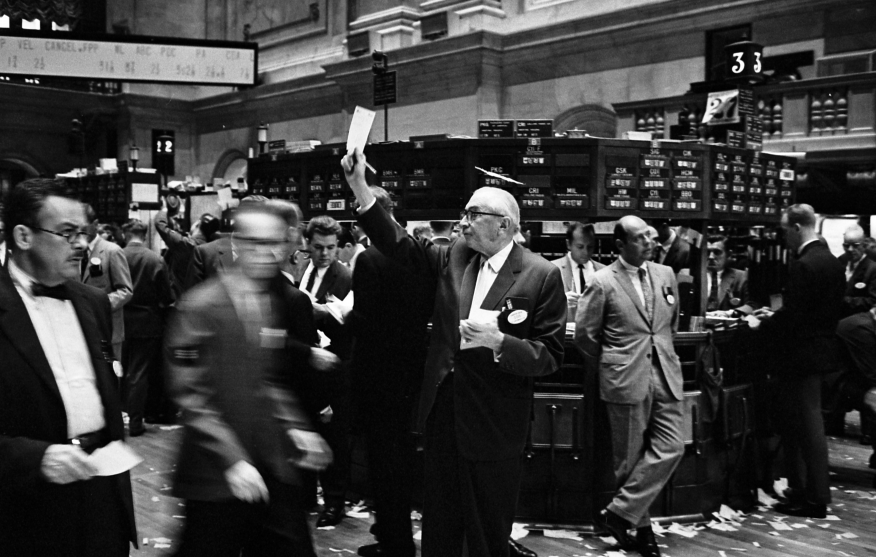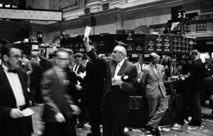The US stock market collapsed. One of the key US indexes - Dow Jones, reflects state of the country's industry, fell by five per cent - more than 900 points - from 4 to 8 January. CNN, citing data from FactSet, says that this year’s beginning was the most difficult for the United States market for the past 119 years.
Another index - S&P 500 (includes five hundred of the most expensive US corporations) - fell by 4.9 percent. This is another anti-record: according to Bloomberg, this is the worst result since 1928, that is, from S&P 500’s introduction.
Stock exchange NASDAQ, trades securities of high-tech companies, came to 8 January with a decline of six per cent. Worse was only 2000, when the so-called dot-com bubble burst in the United States.
Finally, the index MSCI World (calculated by Morgan Stanley, shows the situation on the world stock market) fell by 5.2 percent, and this is also the worst performance ever (since 1998). Overall, the global market has lost 2.5 trillion dollars just in a few days.
Who’s to blame for this? China. In the first days of the year, PBOC launched an ambitious program of renminbi’s devaluation. January 7, value of the Chinese currency dropped to 6.5646 yuan per dollar - least from April 2011. The market reacted quite emotionally - deliberate weakening of the yuan was seen as a sign of the Chinese economy’s weakness (devaluation is a way to support the falling national economy, particularly exporters). Seeing that investors are fleeing, Beijing decided to stop depreciation. January 8, the Chinese regulator has strengthened its currency by 0.02 percent - up to 6.5636 yuan per dollar.
The Chinese stock market was collapsing in parallel with the devaluation. On 4 January, the key Shanghai Composite Index fell by 6.85 percent. January 7 - 7.3 percent. Trading on the Chinese exchanges halted.
Another factor was People's Bank of Statistics’ publication on the state of international reserves. During last year, they fell by a record 513 billion dollars. Only in December 2015, their volume decreased to just $ 108 billion.
China's GDP growth slows. At the end of the third quarter of 2015, the economy added 6.9 percent, the second quarter - 7 percent, the first - 7 percent, too.
Only bad news come from China. The bubble deflates, as investors have overestimated the Chinese economy, investors blew it with too much money. Now, the investments are sipping away.
Why China?
China is one of the world's largest producers and consumers of goods. The country’s economy is tightly integrated into the world. Beijing has established good economic relations with the United States. That is why such negative events as renminbi’s devaluation, Shanghai Composite’s collapse or deterioration in GDP growth hit the US stock market, and the world as a whole.
Decline in oil prices is also obliged to the growing crisis in China, the key consumer of oil. China's economy slows down, demand for fuel is reduced. Global demand for oil falls, so does the price. On 7 January, Brent crude fell to 32.26 dollars per barrel – the least since 2004. The Chinese economic issues affect everyone.
What will happen to the world economy?
According to billionaire George Soros, the world may face a repeat of the 2008 crisis. A new crisis will be launched by China, trying to move to a new economic model - based on not only production and investment, but also on consumption and services. "When I watch the financial markets, I see serious challenges. They are reminiscent of the crisis of 2008 "- said Soros at an economic forum in Sri Lanka on January 7, and urged investors to be cautious.
based on CNN, Bloomberg, CNBC materials
Another index - S&P 500 (includes five hundred of the most expensive US corporations) - fell by 4.9 percent. This is another anti-record: according to Bloomberg, this is the worst result since 1928, that is, from S&P 500’s introduction.
Stock exchange NASDAQ, trades securities of high-tech companies, came to 8 January with a decline of six per cent. Worse was only 2000, when the so-called dot-com bubble burst in the United States.
Finally, the index MSCI World (calculated by Morgan Stanley, shows the situation on the world stock market) fell by 5.2 percent, and this is also the worst performance ever (since 1998). Overall, the global market has lost 2.5 trillion dollars just in a few days.
Who’s to blame for this? China. In the first days of the year, PBOC launched an ambitious program of renminbi’s devaluation. January 7, value of the Chinese currency dropped to 6.5646 yuan per dollar - least from April 2011. The market reacted quite emotionally - deliberate weakening of the yuan was seen as a sign of the Chinese economy’s weakness (devaluation is a way to support the falling national economy, particularly exporters). Seeing that investors are fleeing, Beijing decided to stop depreciation. January 8, the Chinese regulator has strengthened its currency by 0.02 percent - up to 6.5636 yuan per dollar.
The Chinese stock market was collapsing in parallel with the devaluation. On 4 January, the key Shanghai Composite Index fell by 6.85 percent. January 7 - 7.3 percent. Trading on the Chinese exchanges halted.
Another factor was People's Bank of Statistics’ publication on the state of international reserves. During last year, they fell by a record 513 billion dollars. Only in December 2015, their volume decreased to just $ 108 billion.
China's GDP growth slows. At the end of the third quarter of 2015, the economy added 6.9 percent, the second quarter - 7 percent, the first - 7 percent, too.
Only bad news come from China. The bubble deflates, as investors have overestimated the Chinese economy, investors blew it with too much money. Now, the investments are sipping away.
Why China?
China is one of the world's largest producers and consumers of goods. The country’s economy is tightly integrated into the world. Beijing has established good economic relations with the United States. That is why such negative events as renminbi’s devaluation, Shanghai Composite’s collapse or deterioration in GDP growth hit the US stock market, and the world as a whole.
Decline in oil prices is also obliged to the growing crisis in China, the key consumer of oil. China's economy slows down, demand for fuel is reduced. Global demand for oil falls, so does the price. On 7 January, Brent crude fell to 32.26 dollars per barrel – the least since 2004. The Chinese economic issues affect everyone.
What will happen to the world economy?
According to billionaire George Soros, the world may face a repeat of the 2008 crisis. A new crisis will be launched by China, trying to move to a new economic model - based on not only production and investment, but also on consumption and services. "When I watch the financial markets, I see serious challenges. They are reminiscent of the crisis of 2008 "- said Soros at an economic forum in Sri Lanka on January 7, and urged investors to be cautious.
based on CNN, Bloomberg, CNBC materials



















